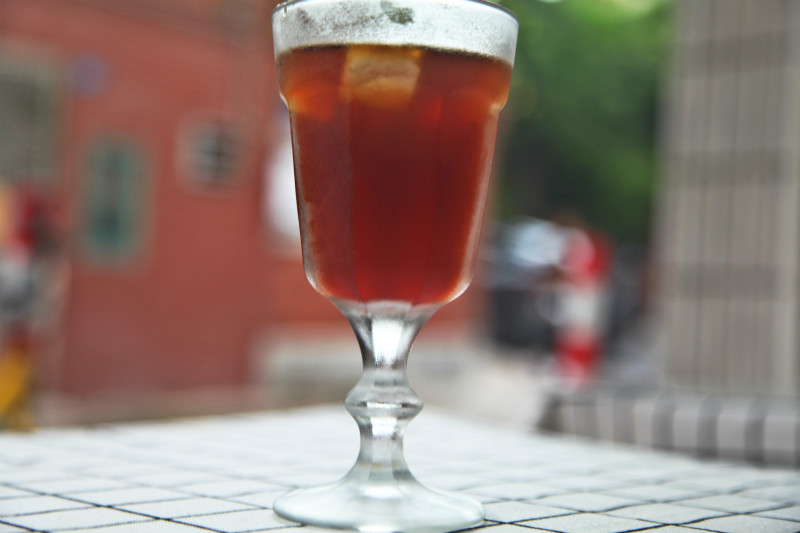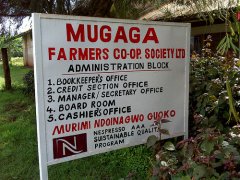Kenya Coffee Sika area introduces Mugaga Mugaga Cooperative Asali Honey processing Plant Baking

Professional coffee knowledge exchange more coffee bean information please follow the coffee workshop (Wechat official account cafe_style)
(Kenya Thika Asali Mugaga Cooperative)
Treatment method: washing method
Baking degree: baking in shallow
Flavor description: you can feel the mellow feeling of considerable weight at the entrance, with obvious BlackBerry tonality as a whole, raising beans for about ten days, with aromas of walnut, spice and blackcurrant, and roughly sour flavors of passion fruit and kumquat. BlackBerry, Hawthorn and orange rich fruit tone, mellow feeling quite thick and full! The whole is like tasting German fruit tea with rich layers.
The words of the bean baker
The Kenya of this honey farm has dark berry notes and rich fruit flavor, which is close to the established impression of Kenya. In order to distinguish it from the Kenyan round beans from another kii processing plant on the shelf, we will slightly extend the baking time and retain its fruity flavor while adding an aftertaste to allow the juicy coffee to stay in the mouth for longer.
It is recommended to cook at a water temperature of 92 degrees. In order to avoid bitterness, the upper limit of boiling or soaking time is 3 minutes.
Introduction of the country of origin
Source: Map of Africa with Countries-outline by FreeVectorMaps.com
Kenya's coffee industry started later than Ethiopia. It was planted in the 19th century, but it was stagnated because of political instability. However, its unique altitude (1600-2100 m), latitude (within 10 degrees of north and south latitude), volcanic geology and unique varieties of SL28 and SL34 still give Kenya a place in the coffee industry. Special smallholder planting culture also makes Kenya unique. Superb Kenyan-style washed coffee is also a credit, making it the second largest coffee producer in Africa.
Important Notice :
前街咖啡 FrontStreet Coffee has moved to new addredd:
FrontStreet Coffee Address: 315,Donghua East Road,GuangZhou
Tel:020 38364473
- Prev

Flavor characteristics of Kenya Sika Coffee production area introduction of Mugaga Mugaga Honey processing Plant
Professional coffee knowledge exchange more information about coffee beans please follow Coffee Workshop (Wechat official account cafe_style) Kenya. Sika. AA Top 1800m Kenya Thika Mugaga Cooperative Asali AA Top mugaga.jpg □ production area: Sika Thika □ producer: Mugaga Cooperative / Honey processing Plant □ altitude: 1800m
- Next

Kenya FAQ Coffee Katongboya Atomboy Processing Plant Barichu Bari Bamboo Cooperative
Professional coffee knowledge exchange More coffee bean information Please pay attention to coffee workshop (Weixin Official Accounts cafe_style) Kenya A-class FAQ-Gatomboya, Mutwewathi, Gakuyuini processing plants Selected batches The latest production season in 2017, Kenya is very well-known three processing plants to serve as raw bean washing production Kenya has seven processing plants ranked in the world
Related
- Detailed explanation of Jadeite planting Land in Panamanian Jadeite Manor introduction to the grading system of Jadeite competitive bidding, Red bid, Green bid and Rose Summer
- Story of Coffee planting in Brenka region of Costa Rica Stonehenge Manor anaerobic heavy honey treatment of flavor mouth
- What's on the barrel of Blue Mountain Coffee beans?
- Can American coffee also pull flowers? How to use hot American style to pull out a good-looking pattern?
- Can you make a cold extract with coffee beans? What is the right proportion for cold-extracted coffee formula?
- Indonesian PWN Gold Mandrine Coffee Origin Features Flavor How to Chong? Mandolin coffee is American.
- A brief introduction to the flavor characteristics of Brazilian yellow bourbon coffee beans
- What is the effect of different water quality on the flavor of cold-extracted coffee? What kind of water is best for brewing coffee?
- Why do you think of Rose Summer whenever you mention Panamanian coffee?
- Introduction to the characteristics of authentic blue mountain coffee bean producing areas? What is the CIB Coffee Authority in Jamaica?

